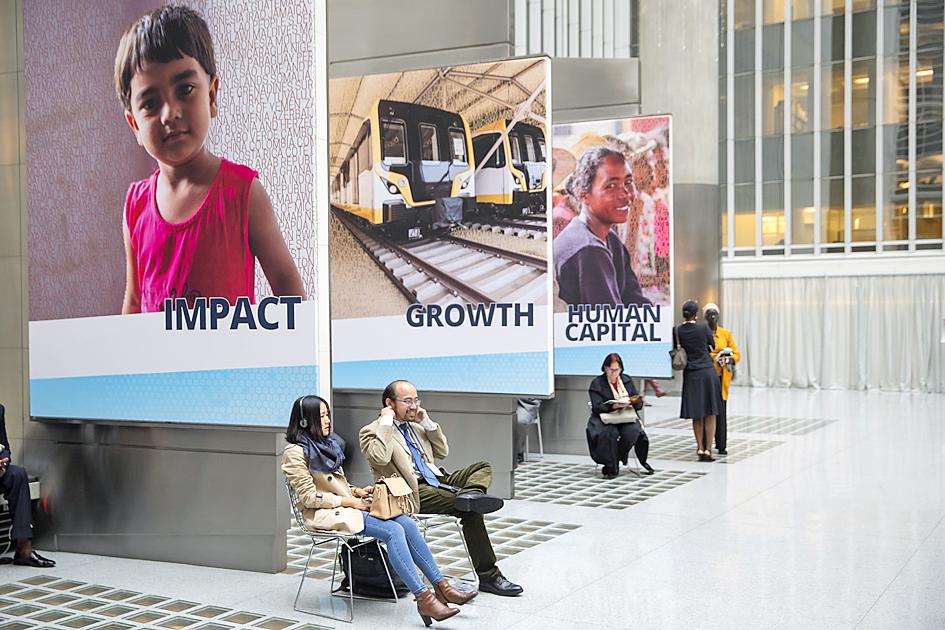World Bank chief economist Carmen Reinhart earlier this week said that the COVID-19 pandemic is turning into a major economic crisis and warned of the possibility of a financial crisis emerging.
“This did not start as a financial crisis, but it is morphing into a major economic crisis, with very serious financial consequences,” Reinhart said. “There’s a long road ahead.”
Reinhart, who took her new role in June, is best known for her work with Kenneth Rogoff, a professor at Harvard University, on the last financial crisis in their 2009 book This Time Is Different: Eight Centuries of Financial Folly.

Photo: EPA-EFE
It made the pair the go-to resource on the history of government defaults, recessions, bank runs, currency sell-offs, and inflationary spikes.
Asked whether central banks buying bonds to keep yields low is ultimately a zero-sum game when everyone is doing it, Reinhart said: “This is a war. During wars governments finance their war expenditures however they can, and right now there are dire needs.”
“The scenario we are in is not a sustainable one,” she added.
Reinhart made the remarks after the world’s richest nations agreed to renew a debt relief initiative for the poorest countries through at least the first half of next year, falling short of the World Bank’s call for a full-year extension.
China is owed almost 60 percent of the money that the world’s poorest nations would be due to repay this year, World Bank data showed.
It has made many loans to developing countries with terms that are not transparent and at higher interest rates than the nations can afford, World Bank president David Malpass said in August.
Asked about China not participating in the debt relief initiative, Reinhart said that Beijing was in fact involved, just “less than fully.”
The China Development Bank, a major lender, has not joined the effort, nor have private sector creditors, she said.
“Full participation is something we should strive for but unfortunately haven’t yet seen,” Reinhart added.

NEW IDENTITY: Known for its software, India has expanded into hardware, with its semiconductor industry growing from US$38bn in 2023 to US$45bn to US$50bn India on Saturday inaugurated its first semiconductor assembly and test facility, a milestone in the government’s push to reduce dependence on foreign chipmakers and stake a claim in a sector dominated by China. Indian Prime Minister Narendra Modi opened US firm Micron Technology Inc’s semiconductor assembly, test and packaging unit in his home state of Gujarat, hailing the “dawn of a new era” for India’s technology ambitions. “When young Indians look back in the future, they will see this decade as the turning point in our tech future,” Modi told the event, which was broadcast on his YouTube channel. The plant would convert

‘SEISMIC SHIFT’: The researcher forecast there would be about 1.1 billion mobile shipments this year, down from 1.26 billion the prior year and erasing years of gains The global smartphone market is expected to contract 12.9 percent this year due to the unprecedented memorychip shortage, marking “a crisis like no other,” researcher International Data Corp (IDC) said. The new forecast, a dramatic revision down from earlier estimates, gives the latest accounting of the ongoing memory crunch that is affecting every corner of the electronics industry. The demand for advanced memory to power artificial intelligence (AI) tasks has drained global supply until well into next year and jeopardizes the business model of many smartphone makers. IDC forecast about 1.1 billion mobile shipments this year, down from 1.26 billion the prior

People stand in a Pokemon store in Tokyo on Thursday. One of the world highest-grossing franchises is celebrated its 30th anniversary yesterday.

Zimbabwe’s ban on raw lithium exports is forcing Chinese miners to rethink their strategy, speeding up plans to process the metal locally instead of shipping it to China’s vast rechargeable battery industry. The country is Africa’s largest lithium producer and has one of the world’s largest reserves, according to the US Geological Survey (USGS). Zimbabwe already banned the export of lithium ore in 2022 and last year announced it would halt exports of lithium concentrates from January next year. However, on Wednesday it imposed the ban with immediate effect, leaving unclear what the lithium mining sector would do in the